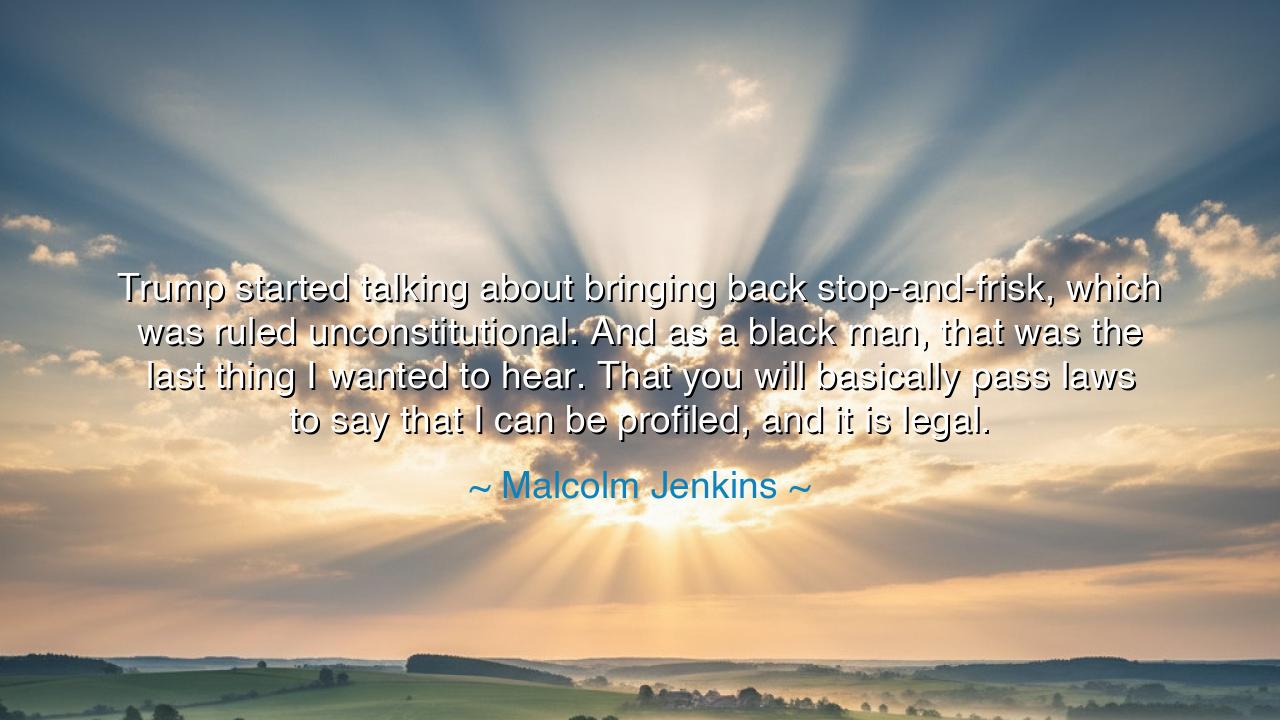
Trump started talking about bringing back stop-and-frisk, which
Trump started talking about bringing back stop-and-frisk, which was ruled unconstitutional. And as a black man, that was the last thing I wanted to hear. That you will basically pass laws to say that I can be profiled, and it is legal.






"Trump started talking about bringing back stop-and-frisk, which was ruled unconstitutional. And as a black man, that was the last thing I wanted to hear. That you will basically pass laws to say that I can be profiled, and it is legal." Thus spoke Malcolm Jenkins, athlete and activist, his words echoing not only his personal fear but the collective memory of a people who have endured centuries of profiling, suspicion, and the weaponization of law against their very existence. His cry is both personal and universal: the law, meant to shield, can also be twisted into a spear.
The origin of this wisdom lies in the bitter history of stop-and-frisk, a policing tactic once defended as a tool for safety, but one that in practice disproportionately targeted Black and Latino communities. Courts later declared it unconstitutional, recognizing that it violated the fundamental rights of those it singled out. And yet, the mere suggestion of reviving it brought back the dread of being reduced not to a citizen, not to a man, but to a profile—a body to be stopped, searched, and judged on sight. Jenkins’ words remind us that when the state grants legal cover to prejudice, it does not create safety, but fear.
History offers us many examples of laws used to justify injustice. Consider the Jim Crow laws of the American South, which were not random acts of prejudice, but legal codes crafted to enshrine inequality. Consider also the pass laws of apartheid South Africa, which required Black citizens to carry documents proving their right to exist in certain spaces. In both cases, the law itself became an instrument of oppression. Jenkins’ fear is born from this same pattern: when profiling is legalized, dignity is erased, and justice collapses into tyranny.
His words also strike at a deeper truth: the distinction between what is legal and what is just. Many evils have been clothed in legality, from slavery to segregation. But legality is not morality. Jenkins recognizes that the suggestion of restoring stop-and-frisk was not merely about policing—it was about legitimizing suspicion, enshrining the idea that his skin itself is grounds for intervention. To declare such a practice “legal” is to declare him and millions like him permanently suspect in the eyes of the state.
Yet within his lament lies a heroic warning: laws are not unchangeable, and silence cannot be an option. He speaks not only for himself, but for every Black man, every marginalized voice who fears the hand of the law more than the hand of the criminal. By speaking, Jenkins transforms fear into defiance, vulnerability into testimony. He shows that to name injustice is the first step toward defeating it.
The lesson for us is clear: guard against laws that masquerade as protection while carrying within them the seeds of discrimination. Question policies that promise safety at the expense of liberty, for they too often provide neither. Remember that the strength of a society is not measured by how it treats the powerful, but by how it protects those most easily targeted.
What practical steps must we take? Defend constitutional rights, ensuring they are not eroded in the name of expediency. Stand alongside those who are profiled, offering solidarity and amplifying their voices. Educate ourselves and others about the long history of laws that justified oppression, so that we may recognize their modern echoes. And above all, refuse to allow fear or convenience to justify the stripping away of dignity from any community.
So let Malcolm Jenkins’ words be remembered: when laws allow profiling, injustice becomes legal. And once injustice is clothed in law, it is harder to see, harder to fight, and far more dangerous. But if we remain vigilant, if we demand justice over legality, then we may yet build a society where no man fears being reduced to a profile, and where the law once more serves its true purpose: to protect, not to oppress.






AAdministratorAdministrator
Welcome, honored guests. Please leave a comment, we will respond soon